SEO Secrets I've Learned at Wix

SEO secrets are always a hot topic in digital marketing and being an SEO specialist at Wix.com has taught me a lot about this world.
The technical challenges were huge, the competition was crazy (Shopify, Square, WordPress, etc.).
But the great people I’ve worked with and the amazing projects I have been a part of, made every day at Wix an exciting adventure.
In this blog post, I’ll try to share some SEO secrets, hopefully, you’ll find some insights that will help you in your SEO journey.
Table of Contents
Understanding the Importance of SEO in Tech Companies
SEO plays a crucial role in the success of tech companies, especially those that rely on online visibility and traffic for business growth.
In today’s digital landscape, where almost everything is available online, having a strong SEO strategy can make or break a company’s success, especially when the company’s product is a website-building platform like Wix.
We understood the importance of SEO and its impact on our business and therefore could invest in PR, content marketing, amazing tools, lessons, collaborations, and much more which helped us to achieve our goals.
Ensuring that your superiors provide the necessary resources to effectively compete with industry giants is a pivotal stride towards achieving SEO success.
In both B2C SEO and B2B SEO, having a large budget dedicated to SEO and content marketing is essential.
Adapt to Algorithm Changes

One of the biggest challenges for any SEO service provider is keeping up with the constantly changing algorithms of search engines like Google.
Just when you think you have figured out the perfect strategy to boost your website’s ranking, an algorithm update comes along and throws everything off balance.
But instead of seeing it as a problem, I’ve learned to see it as an opportunity to adapt and evolve our SEO strategies.
We always stay updated with the latest algorithm changes and make necessary adjustments to ensure our website stays visible in search results.
There is indeed pressure from the bosses to constantly improve the SEO efforts, and not all of them fully understand how complicated SEO is (Head of Marketing, PMMs, etc.).
The main tip here is to educate and communicate the impact of these constant changes and how we need to adapt to them.).
Also, don’t change your whole SEO strategy immediately following an algorithm update, instead try to analyze the changes and make gradual adjustments.
Remember that SEO is holistic and requires a long-term approach and as long as you’re doing the right things, your website will eventually rank well.
Content is One of the Best SEO Secrets
At big companies with established websites, the SEO content team is often responsible for optimizing existing content and creating new content.
Your job as an SEO specialist is to work closely with the content team and ensure that their work aligns with your overall SEO strategy:
- Make sure to create blog posts based on relevant keywords.
- Create a clear and detailed brief that outlines the SEO goals for each piece of content.
- Collaborate with industry leaders and influencers to create high-quality, shareable content that can attract backlinks.
- Use facts, data, infographics, images, and tables, and based on high-authority sources, to make your content more valuable and authoritative.
- Don’t be afraid to link to other websites in your content, this can help establish a relationship and make your content more natural and trustworthy.
- Regularly review and update old content, adding new information or refreshing it with current trends, to maintain its relevance in search results.
- Make sure the optimization of these content pieces is aligned with the highest levels of SEO (Titles, descriptions, friendly URL, alt text, inner links, etc.)
Don’t Be Afraid of a JavaScript Website
JavaScript is a scripting language that allows developers to create dynamic websites by adding interactivity and functionality.
While in the past, search engine crawlers had difficulty reading JavaScript code, today they have greatly improved their ability to understand it.
But – in reality, Google still struggles with JavaScript to some extent (because crawling JavaScript costs a lot of money) so as an SEO specialist, you must ensure that your website is being crawled and rendered properly:
Use SSR
Use SSR or pre-rendering techniques to make sure that your website is being indexed correctly.
Test your website’s rendering

Test your website’s rendering with Google’s URL Inspection Tool (live test) to ensure it is being rendered accurately.
Check your website manually
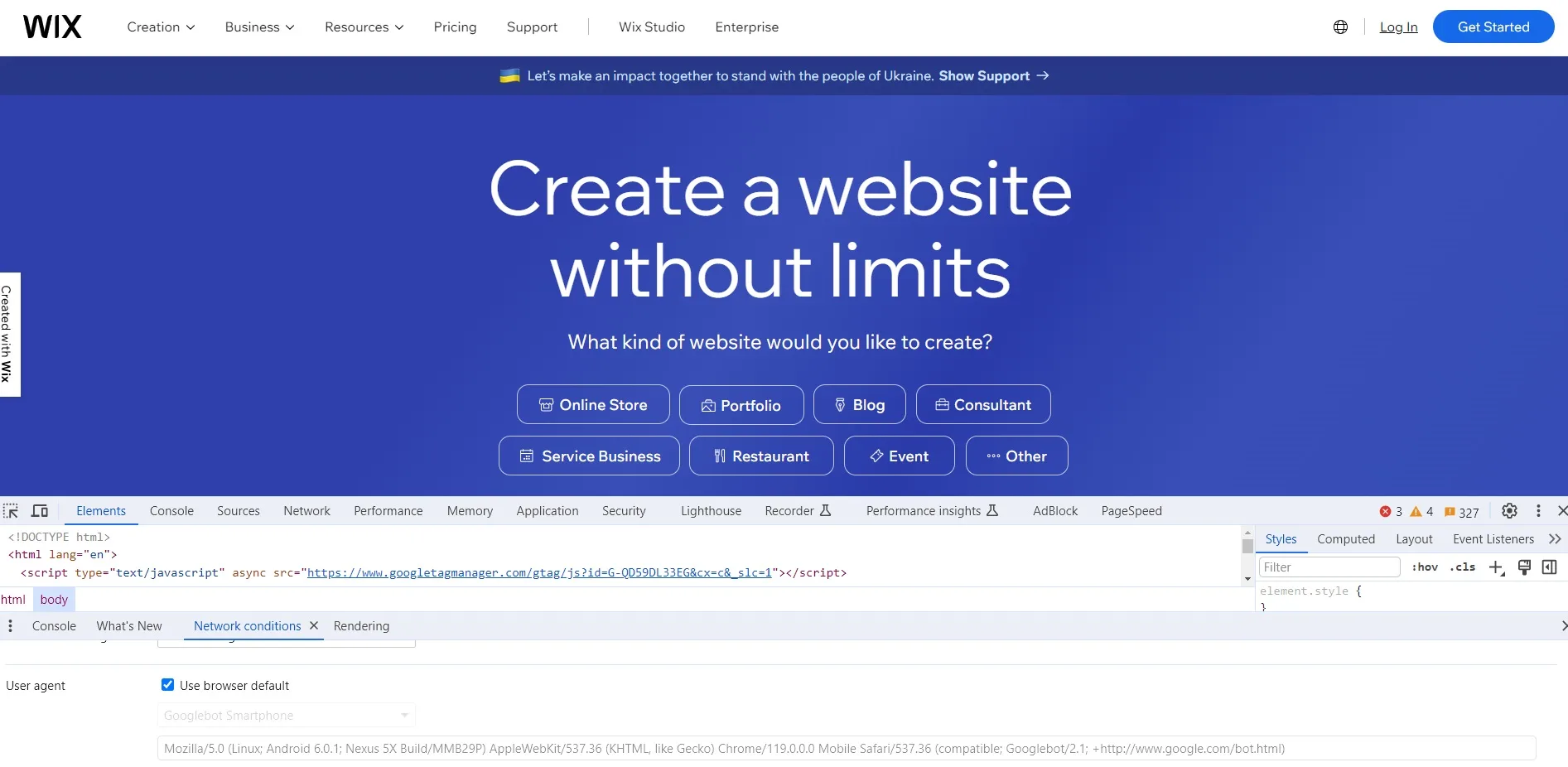
Go to incognito mode, enter the website you want to inspect, and click on
INSPECT > NETWORK CONDITIONS > Checkmark “DISABLE CACHE” > USE BROWSER DEFAULT and choose “Googlebot smartphone“.
Then reload the page and see if there is any visual issue, content missing or not working properly.
Make sure that inner links are written HTML
Not the whole site should be based on JavaScript, so make sure inner links, “read more” and the like are written in HTML.
Use tags
Take advantage of semantic tags in HTML5 such as <header>, <footer>, <article>, <section> to help search engines understand the structure of your website.
Want More Traffic?
Understand the Power of PageRank and CheiRank
PageRank is a Google algorithm that uses links to determine the importance of a website.
CheiRank, on the other hand, works similarly but focuses on external links rather than internal ones.
When working on a “supersite” like wix.com, which receives many links naturally, you need to take advantage of this and make sure of the following:
- Check how many natural links you received. If those links point to blog posts, make sure those posts have inner links to the site’s money pages as well as other important blog posts.
- Regularly check your external links with a tool like Screaming Frog, to ensure you’re not linking to your competitors, irrelevant websites, or 404 pages.
- Check pages’ 2D-Rank (both PageRank and CheiRank) to understand how well they’re performing in terms of link equity. The best tool for this mission, IMO, is audisto.com.
Collaborate With Other Brands for Links and More
Although big brands receive many links naturally, getting even more quality links is always better.
Contact affiliates
Try to contact affiliates and ask them to insert links in your brand mentions or allow you to publish a post on their blog (make sure they don’t include affiliate parameters on those links).
Get help from your company’s PR
Ask the help of your company’s PR/content team to secure interviews, guest posts, or mentions on relevant and high-authority websites (while I worked at Wix.com, we even got a link from Amazon).
Collaborate with other brands in your niche
Collaborate with other brands in your niche to create valuable content or organize events together. This will lead to cross-promotion and potential link opportunities.
Contact industry influencers
Contact industry influencers and offer them something valuable (e.g. exclusive content, product samples) in exchange for a link on their website or social media channels.
Utilize social media
Utilize social media to connect with other businesses and share each other’s content, which can lead to natural backlinks from their followers.
Participate in online communities and forums
Participate in online communities and forums related to your industry and provide helpful insights, which can attract attention from other brands and spark collaborations.
Attend conferences
Attend conferences, workshops, meetups, and trade shows to network with other businesses and potentially form partnerships that can lead to valuable backlinks.
Take Advantage of Brainstorming
One of the main advantages of in-house SEO brainstorming is the ability to collaborate with your team and bounce ideas off of each other.
It could be a technical challenge, wording for a blog post, identifying potential link opportunities, and much more.
Each one of the group can bring his/her unique perspective and expertise to contribute to the discussion.
During brainstorming sessions, it’s important to encourage everyone to share their ideas freely without judgment.
This allows for a diverse range of ideas, which can lead to innovative solutions and out-of-the-box thinking.
I can tell that most of what I know, I learned from SEOs I had the honor to work with and brainstorm together and that gave me the ability to start B.H Digital and be confident that the company can deal with any challenge.
Put User Experience on The Top of Your Priorities
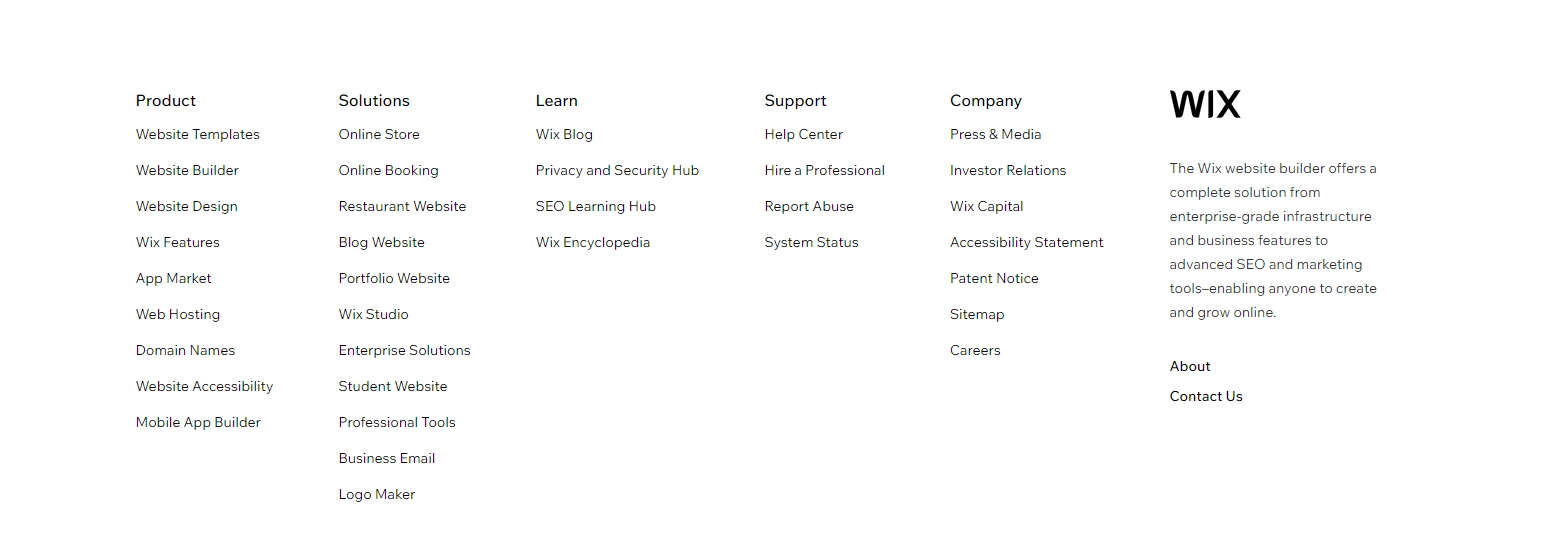
While technical SEO and backlinks are important for ranking, UX and SEO are also good friends, and when working harmoniously together they can create a better overall user experience.
If working on big sites, especially multilingual, user experience should be at the forefront of your mind.
The most important SEO secret here is to help users easily find what they are looking for without feeling overwhelmed or confused.
For example, on wix.com’s home page, you can see a great navigation experience, with the main categories of their website visible.
Another SEO Secret is to use WebP or AVIF image formats which are more optimized and weigh less, improving site speed and ultimately user experience.
Many SEOs still don’t use those formats, so it could be a competitive advantage to stand out among other websites.
Good Copywriting = Better CTR
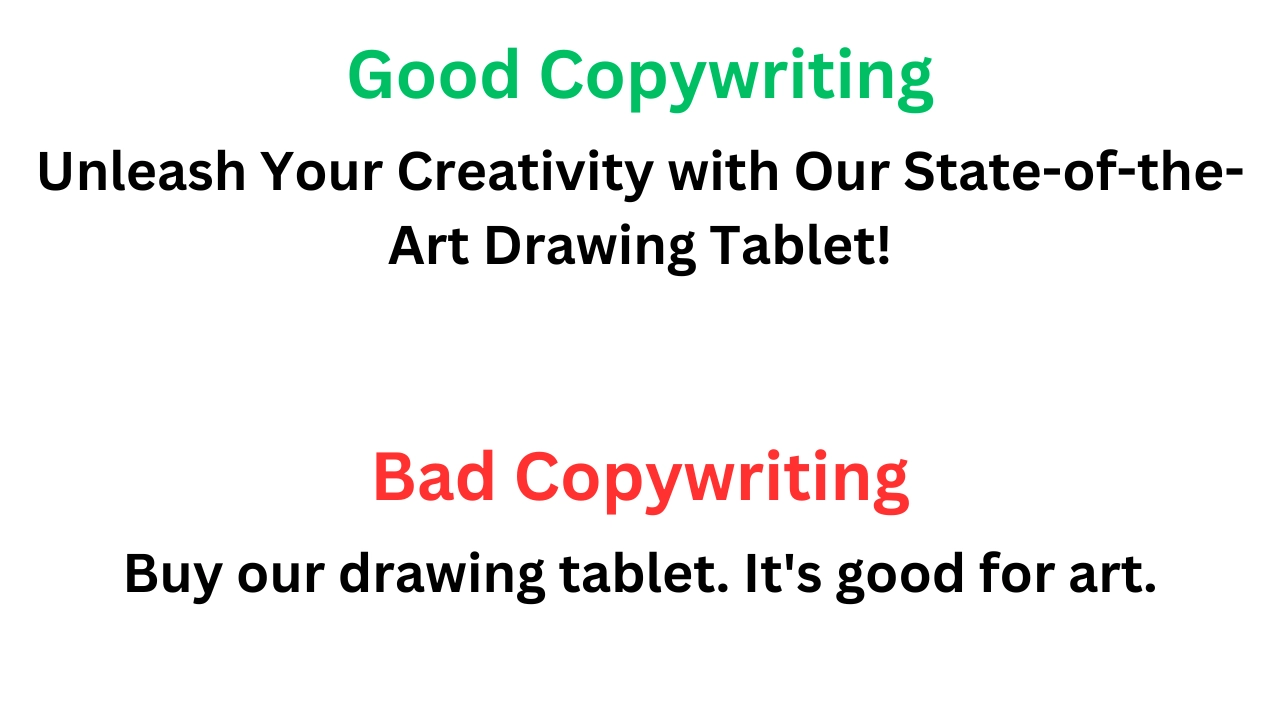
Copywriting is often overlooked by SEOs, but it plays a crucial role in click-through rates (CTR) and engagement.
A good copy can entice users to click on your link and visit your website, which ultimately improves your organic traffic and rankings.
When working on big companies with a big SEO team, you can take advantage of that and ask for ideas for copywriting and improving your title tags and meta descriptions.
While my time at Wix, we increased the CTR of the Wix eCommerce page by almost 1%, just because we updated the title and meta description with a better copy.
SEO Shouldn’t Be Measured Only by Rankings
One of the biggest misconceptions about SEO is that it should only be measured by rankings and leads.
While those are important metrics, they don’t paint the full picture of an effective SEO strategy.
Of course, the bottom line should be how much money SEO brings in, but there are also other important metrics to consider.
When working on a site’s SEO and improving all of its aspects (speed, content, design, accessibility), you can also expect other marketing channels to perform better.
This is because a well-optimized website not only ranks higher on search engines but also provides a better user experience and builds trust with potential customers.
Moreover, an effective SEO strategy can also lead to increased brand awareness and credibility, which can contribute to overall business success.
Ensure That the Entire Site Has a Uniform Design
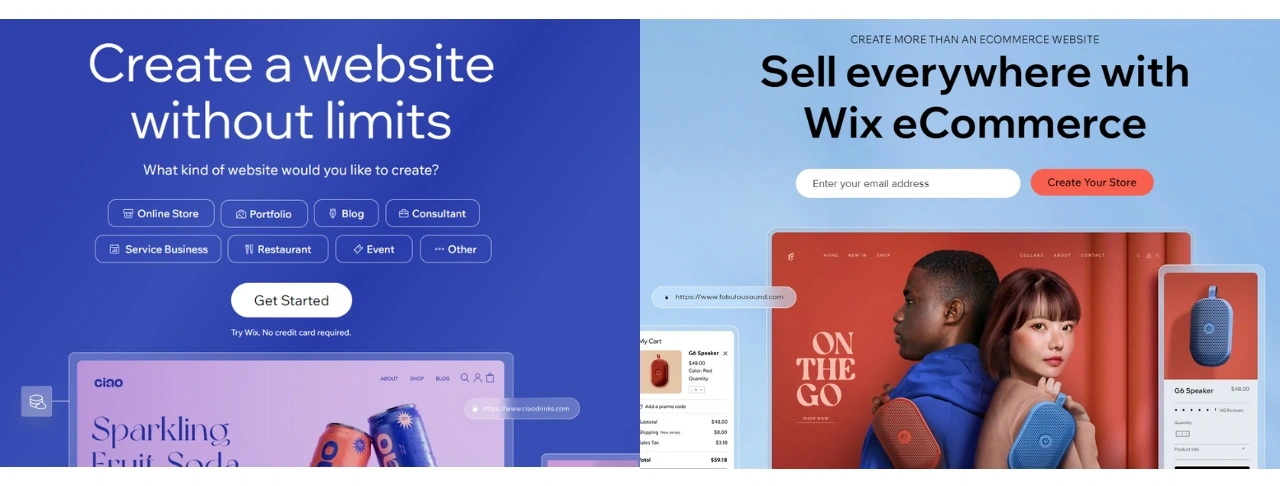
Another crucial SEO problem, mostly in big sites and brands is having different designs for each page or section, causing inconsistency and confusion among users.
In the image above, you can see what it looks like when the design line is similar in two (at least) important pages.
Having a uniform design not only improves user experience but also helps with search engine optimization.
Users are more likely to trust a website that has a consistent design, as it portrays professionalism and attention to detail.
It’s also easier to navigate through a website with a uniform design, which can lead to increased time spent on the site and, ultimately, better search engine rankings.
Moreover, a unified design can also help establish your brand identity and make your website more visually appealing to visitors.
Ensure that all pages on your site follow the same design guidelines and stay consistent with branding elements such as colors, fonts, and layouts.
Keep an Eye on What Other Departments Upload to the Site
In big companies, many departments are involved in creating and uploading content to the website.
Honestly, this is an SEO nightmare as most of those departments don’t pay attention to SEO best practices, which can negatively impact the overall SEO strategy.
The SEO secret here is to first, communicate and educate other departments on the importance of following SEO guidelines when creating and uploading content.
You can also create a checklist or template for them to use, which includes essential elements like meta titles, descriptions, and optimized images.
Additionally, regularly check and monitor the content uploaded by other departments to ensure it meets SEO standards.
You will most likely find pages with no indexed and no follow tags, pages with thin content, blog posts with no actual targeted keyword, and so on.
By keeping an eye on other departments’ content, you can ensure that the site’s overall SEO efforts are not undermined by one department’s mistakes which can also cost Google’s crawl budget.
The SEO Secret: Optimize Crawl Budget
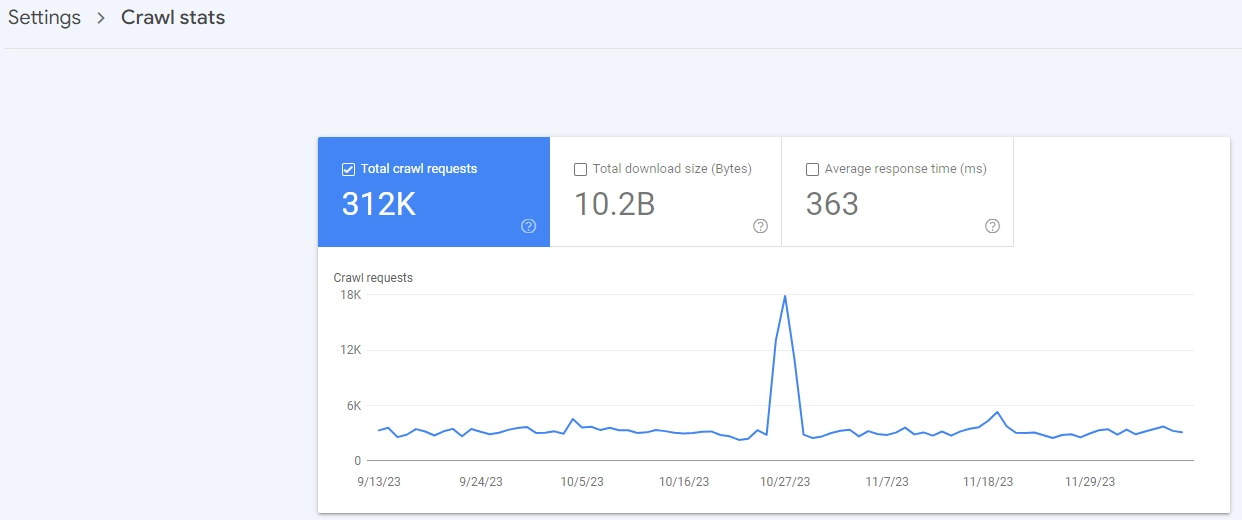
In my opinion, this is one of the most important SEO secrets behind successful SEO strategies. especially on big sites.
To check your crawl budget, you need to monitor your site’s crawl rate in Google Search Console regularly (I do this every day and sometimes a few times a day, but that’s me 🙂
To optimize your website’s crawl budget, you need to make sure that you don’t have any unnecessary or low-quality pages indexed.
This means regularly checking and cleaning up duplicate content, thin content, redirects, 404 error pages, and pages with low traffic/purpose (and you will find many of those) from the site.
By doing this, you are telling search engines that your website is well-maintained and only consists of quality pages worth indexing.
Additionally, the fewer pages your site has, the more potent the impact of link juice will be because the links’ “energy” will be concentrated on fewer pages.
This, in turn, can lead to better rankings for the remaining pages and ultimately improve your site’s overall SEO performance.
Leverage Social Media to Boost Your SEO
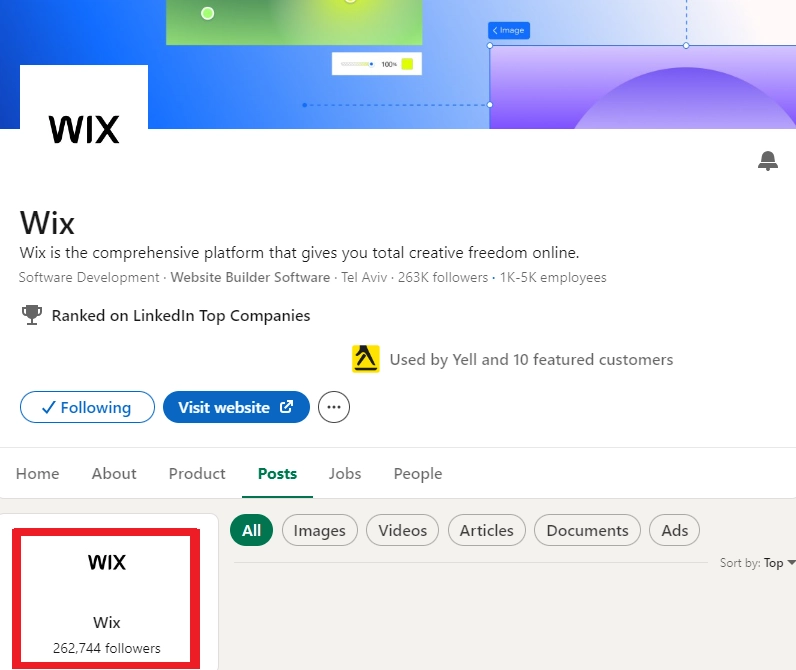
Social media presence is crucial for any business, and it also plays a role in your website’s SEO.
Take advantage of your big site’s brand recognition and promote your content through social media channels.
This will not only increase your website’s visibility but also drive traffic to your site, which is a positive signal for search engines.
Moreover, social media can help you build backlinks to your website, which is another essential aspect of SEO.
I see how social media become more and more integrated into search engine algorithms, and its influence on SEO will only continue to grow.
Conclusion
I can go on with more SEO secrets and tips, but this article is already too long, and I don’t want to bore you with too much technical information.
What I do hope is that you’ve learned something new, even one, about SEO and how it can benefit your website’s visibility and performance.
Remember, do things correctly and the results will come, even if you see some drops in rankings at the beginning or after an algo update.
Good SEO practices will always pay off in the long run, and your website will thank you for it.
Also, don’t forget to consult with other SEOs in your team or colleagues, learn from them, and share your knowledge as well.
SEO is constantly evolving, so it’s essential to stay updated and adapt to changes in the industry.
I wish you all the best on your SEO journey and hope to see your website at the top of search engine result pages!

Moshe Ben Haim
Moshe Ben Haim is an SEO expert and the founder and CEO of B.H Digital.
With over 7 years of experience in the field, Moshe has helped countless clients increase their visibility and reach potential customers online.
Before founding B.H Digital, Moshe worked as an SEO specialist at top-notch companies like Wix, 888 Holdings and Verbit.


